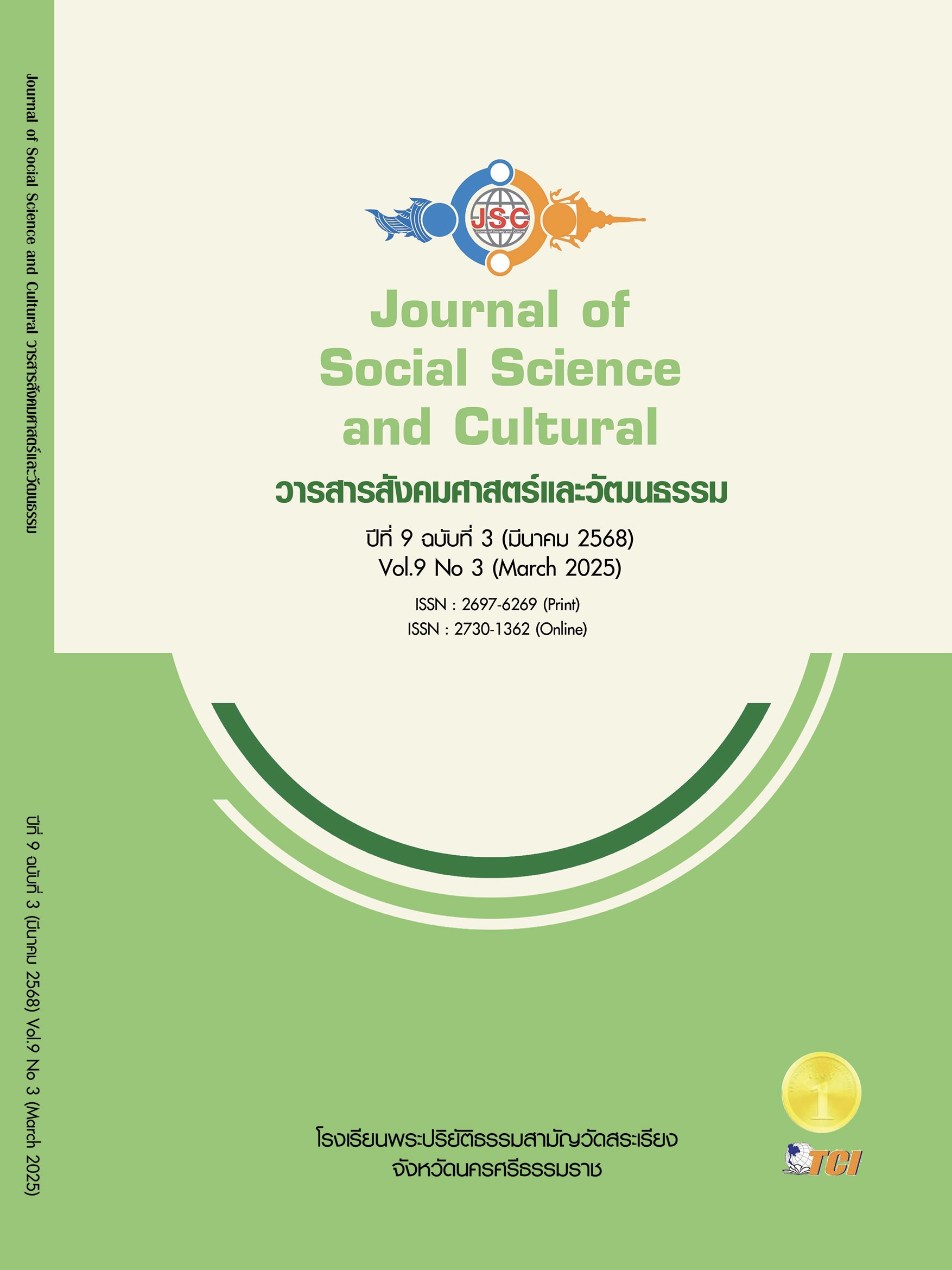THE RELATIONSHIP BETWEEN GOVERNMENT MEASURES AND FACILITATION TOWARD THE DECISION TO ADOPT BATTERY ELECTRIC VEHICLES IN KHON KAEN
Main Article Content
Abstract
This research explores the overall adoption of battery electric vehicles (BEVs) in Khon Kaen Province. It analyzes the relationship between government measures and facilitation efforts and the residents' decision to adopt BEVs and proposes policy recommendations to promote and drive government initiatives supporting BEVs adoption, which is expected to grow continuously in the future. A quantitative approach was employed, targeting a population of 3,344 BEVs users in Khon Kaen. A multi - stage sampling method ensured comprehensive coverage across the province, and data were collected using a questionnaire with a reliability coefficient of 0.90. Descriptive statistics and multiple regression analysis were used for data analysis. The findings reveal that most respondents were female, aged 21 and 25, employed in private companies, held a master’s degree, and earned an income between 20,001 to 30,000 THB. The multiple regression analysis revealed that the government EV 3.5 measures significantly influenced the decision to adopt BEVs, particularly subsidies and reduced import duty on completely built - up BEVs. In terms of facilitation, key factors that had a significant impact included the coverage of charging stations, standardized service centers, and lower insurance premium. Regarding demographics, age negatively affected BEVs adoption. Policy recommendations should focus on expanding the charging station network by promoting collaboration between the public and private sectors, enhancing the standards of electric vehicle service centers, and adjusting insurance systems to offer reasonable pricing. Public awareness campaigns should be conducted using media appropriate for each target group. Additionally, government policies should increase subsidies for middle - and low - income groups to reduce price barriers, along with tax measures to stimulate interest and promote the sustainable adoption of electric vehicles in the future.
Article Details
References
กลุ่มสถิติการขนส่ง. (2566). กองแผนงานกรมการขนส่งทางบก. เรียกใช้เมื่อ 23 สิงหาคม 2567 จาก https://web.dlt.go.th/statistics/
กัลยา วานิชย์บัญชา. (2561). การใช้ SPSS for Window ในการวิเคราะห์ข้อมูล. (พิมพ์ครั้งที่ 31). กรุงเทพมหานคร: ศูนย์หนังสือจุฬาลงกรณ์มหาวิทยาลัย.
นนทกร วิจิตรสงวน และคณะ. (2567). ปัจจัยที่ทำให้ผู้บริโภคตัดสินใจเลือกบริโภครถยนต์ไฟฟ้า (EV) ในประเทศไทย. วารสารเศรษฐศาสตร์และนโยบายสาธารณะ, 15(29), 131-149.
บุญใจ ศรีสถิตย์นรากูร. (2555). การพัฒนาและตรวจสอบคุณภาพเครื่องมือวิจัย: คุณสมบัติการวัดเชิงจิตวิทยา. (พิมพ์ครั้งที่ 1). กรุงเทพมหานคร: โรงพิมพ์แห่งจุฬาลงกรณ์มหาวิทยาลัย.
บุญมา อิ่มวิเศษ. (2567). ปัจจัยที่มีอิทธิพลต่อการเลือกซื้อรถยนต์ไฟฟ้า (EV) ของประชาชนในเขตอำเภอเมือง จังหวัดนครราชสีมา. วารสารวิทยาการจัดการ มหาวิทยาลัยราชภัฏธนบุรี, 6(1), 40-58.
ประติ สุวรรณปักษิณ และศุภสิทธิ์ เลิศบัวสิน. (2564). รูปแบบการพัฒนาการบูรณาการนโยบายภาครัฐเพื่อการส่งเสริมอุตสาหกรรมรถยนต์ไฟฟ้าที่ยั่งยืนของประเทศไทย. วารสาร RMUTT Global Business and Economics Review มหาวิทยาลัยเทคโนโลยีราชมงคลธัญบุรี, 16(2), 155-170.
ภัทรลดา สินทรัพย์. (2562). การศึกษาปัจจัยและประเมินการเติบโตของของรถยนต์ไฟฟ้าในประเทศไทย. ใน วิทยานิพนธ์วิทยาศาสตรมหาบัณฑิต สาขาวิชาเทคโนโลยีและการจัดการพลังงาน. จุฬาลงกรณ์มหาวิทยาลัย.
ภูรี สิรสุนทร. (2562). ยานยนต์ไฟฟ้า (EV)...ทางแก้ปัญหาสิ่งแวดล้อมอย่างยั่งยืน. เรียกใช้เมื่อ 23 สิงหาคม 2567 จาก https://www.greennetworkthailand.com/ยานยนต์ไฟฟ้า-ev/
มนนภา เทพสุด และขนิษฐา ชัยรัตนาวรรณ. (2567). ภาวะโลกร้อน: ภัยคุกคามร้ายแรงที่ถูกขับเคลื่อนบนโลกยุคอุตสาหกรรม. วารสารสมาคมนักวิจัย, 29(2), 96-113.
ศศิธร สุ่มหลิม และคณะ. (2566). ความตั้งใจซื้อรถยนต์ไฟฟ้าในประเทศไทย. วารสารบริหารธุรกิจ, 13(1), 92-104.
ศุภลักษณ์ ศิริยานนท์ และรัชพันธุ์ เชยจิตร. (2567). ปัจจัยที่มีผลต่อการเลือกซื้อรถยนต์ไฟฟ้าของพนักงานบริษัทเอกชนในเขตกรุงเทพมหานคร. วารสารวิชาการมหาวิทยาลัยหอการค้าไทย มนุษยศาสตร์และสังคมศาสตร์, 44(2), 1-19.
สำนักงานขนส่งจังหวัดขอนแก่น. (2567). สถิติจำนวนรถตามกฎหมายว่าด้วยรถยนต์และตามกฎหมายว่าด้วยการขนส่งทางบก จำแนกตามชนิดเชื้อเพลิง. เรียกใช้เมื่อ 1 สิงหาคม 2561 จาก https://kkn.dlt.go.th/th
สำนักนโยบายและแผนพลังงานกระทรวงพลังงาน. (2565). คู่มือโครงการจัดทำแผนการพัฒนาสถานีประจุไฟฟ้าแบตเตอรี่สำหรับยานยนต์ไฟฟ้าเพื่อรองรับเป้าหมายการส่งเสริมยานยนต์ไฟฟ้าของประเทศ. เรียกใช้เมื่อ 23 สิงหาคม 2567 จาก https://www.eppo.go.th/images/energy-conservation/EV/EV_Manual.pdf
สิริฤกษ์ ทรงศิวิไล. (2565). มหาวิทยาลัยกับการมุ่งไปสู่ความเป็นกลางทางคาร์บอนเพื่อการพัฒนาอย่างยั่งยืน ใน การประชุมวิชาการที่ประชุมอธิการบดีแห่งประเทศไทย ประจำปี 2565. กรุงเทพมหานคร: กระทรวงการอุดมศึกษา วิทยาศาสตร์ วิจัยและนวัตกรรม.
หอการค้าจังหวัดขอนแก่น. (2563). ข้อมูลน่าสนใจจังหวัดขอนแก่น. เรียกใช้เมื่อ 8 กันยายน 2567 จาก https://www.kkcc.or.th/khonkaen-information
อิสราภา ทิพย์รงค์ และภิรดา ชัยรัตน์. (2566). การยอมรับรถยนต์ไฟฟ้าของผู้บริโภคในเขตกรุงเทพมหานคร. Journal of Roi Kaensarn Academi, 8(5), 99-113.
ไอลดา ธรรมสังข์. (2564). ปัจจัยที่ส่งผลต่อการตัดสินใจใช้รถยนต์ไฟฟ้าของประชาชนในจังหวัดชลบุรี. ใน สารนิพนธ์บริหารธุรกิจมหาบัณฑิต สาขาบริหารธุรกิจ. มหาวิทยาลัยรามคำแหง.
Faul, F. et al. (2009). G*Power 3: A flexible statistical power analysis program for the social, behavioral, and biomedical sciences. Behavior Research Methods, 41(4), 1149-1160.
Hair, J. F. et al. (2020). Multivariate data analysis. (8th ed.). Boston: Cengage Learning.
Kamnuansilpa, P. et al. (2023). Local economic development in Thailand. Journal of International Development, 35(7), 1852-1873.
Michie, J. & Zumitzavan, V. (2016). The impact of ‘learning’ and ‘leadership’ management styles on organizational outcomes: A study of tyre firms in Thailand. Asia Pacific Business Review, 18(4), 1-24
Mitchell, J. (2024). Challenges and opportunities for electric vehicles in emerging markets. Journal of Sustainable Energy Studies, 19(3), 45-62.
Patton, M. Q. (2015). Qualitative research & evaluation methods. (4th ed.). New York: SAGE Publications.
Wang, J. et al. (2017). Battery electric vehicle energy consumption prediction for a trip based on route information. Proceedings of the Institution of Mechanical Engineers, Part D: Journal of Automobile Engineering, 232(11), 1528-1542.
Yamane, T. (1973). Statistics: An introductory analysis. (3rd ed.). New York: Harper & Row.


